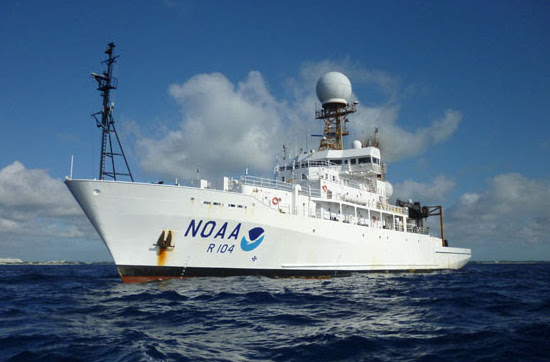(WASHINGTON) — The National Oceanic and Atmospheric Administration’s effort to recapitalize its aging fleet of research ships took a major step forward on Dec. 31 with the U.S. Navy’s award of a $178 million contract to Thoma-Sea Marine Constructors LLC of Houma, La., for the detailed design and construction of two new oceanographic ships for the agency. NOAA is acquiring the vessels through an agreement with the Naval Sea Systems Command (NAVSEA), a leader in building, providing and procuring large research ships for the nation’s research fleet.
“We can all be proud that these two new NOAA ships will be built in the United States by highly skilled workers, and to the highest standards,” said U.S. Secretary of Commerce Wilbur Ross. “The nation will benefit greatly from the information these state-of-the-art vessels will collect for decades to come.”

The first ship, to be named Oceanographer, will be home-ported in Honolulu. The second ship, to be named Discoverer, will be assigned a home port at a future date. Both vessels will continue the legacies of their namesakes. The first Oceanographer served in the NOAA fleet from 1966 to 1996 and its sister ship, Discoverer, served from 1967 to 1996.
The new ships will support a wide variety of missions, ranging from general oceanographic research and exploration to marine life, climate and ocean ecosystem studies. These missions include shallow coastal, continental shelf and worldwide ocean survey and data collection.
Designed as single-hull ships, Oceanographer and Discoverer will be built to commercial standards. They will incorporate the latest technologies, including high-efficiency, environmentally friendly EPA Tier 4 diesel engines, emissions controls for stack gases, new information technology tools for monitoring shipboard systems, and underwater scientific research and survey equipment.
“These state-of-the-art ships will play a vital role in collecting high-quality data and leading scientific discoveries,” said Dr. Neil Jacobs, acting NOAA administrator. “The science missions aboard these vessels promise to push the boundaries of what is known about our still largely undiscovered ocean.”
The ships will be equipped to launch workboats, perform maintenance on buoys and moorings, deploy scientific instruments to collect weather and water column data, and conduct seafloor mapping surveys. Each vessel will operate with a crew of 20 and will accommodate up to 28 scientists.
“This contract award represents a major step forward in the process to recapitalize NOAA’s ship fleet,” said NOAA Rear Adm. Michael Silah, director of the NOAA Commissioned Officer Corps and NOAA Office of Marine and Aviation Operations (OMAO). “We thank the Navy, our valued partner, for its assistance with this acquisition.”
The NOAA ship fleet is operated, managed and maintained by OMAO, which is composed of civilians and officers with the NOAA Commissioned Officer Corps, one of the nation’s eight uniformed services.
– National Oceanic and Atmospheric Administration
